#john reed
Text
The way Sally sort of got a happy ending on the surface but is clearly very much Not Well

The way John exists as an emotional support for his mother and might never truly unpack any of his trauma because he's living in denial of what his father did and possibly what his mother did as well

The way Gene got his revenge on Barry but because of that spent the rest of his life in prison and with his reputation forever destroyed and nobody to worship him
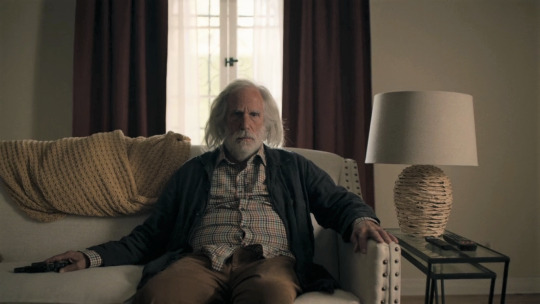
The way Fuches accepted his own heartlessness and because he's a cockroach will probably die at age 102, but will live out every single one of those years completely devoid of love
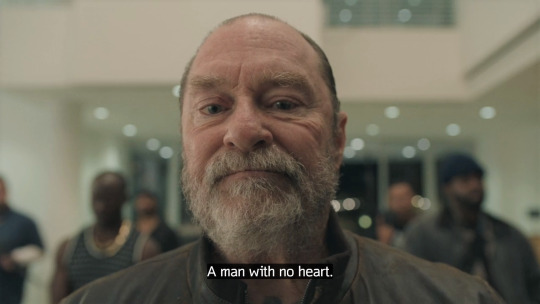
The way Hank only ever wanted to be safe but his story ended with him dead and holding the hand of the love of his life whose death Hank helped bring about
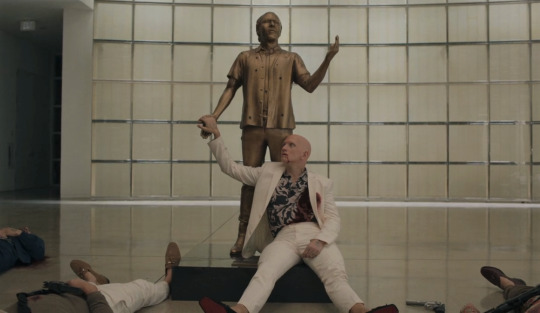
The way Barry was finally going to turn himself in and maybe take his first steps toward redemption but then he fucking died
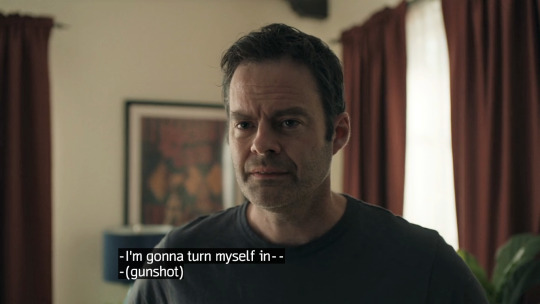
Bonus: the way Jim Moss's greatest desire was justice for his daughter and he ended up getting it completely wrong, and he'll never know the real truth

#barry hbo#barry spoilers#barry berkman#noho hank#monroe fuches#gene cousineau#sally reed#jim moss#john#john berkman#or maybe#john reed#?#op
963 notes
·
View notes
Text



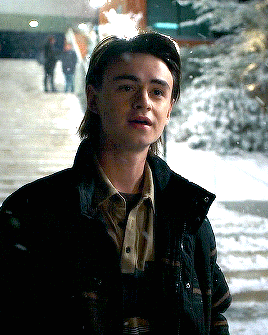


JAEDEN MARTELL
BARRY | 4.08 "wow"
168 notes
·
View notes
Text
Two stories of the russian revolution where John Reed and Nestor Makhno recount how they nearly got killed by their own side over a misunderstanding
- - -
-John Reed from “Ten Days That Shook the World”:
The truck hurtled on toward Romanov, through the bright, empty day. At the first cross-roads two soldiers ran out in front of us, waving their rifles. We slowed down, and stopped.
“Passes, comrades!”
The Red Guards raised a great clamour. “We are Red Guards. We don’t need any passes…. Go on, never mind them!”
But a sailor objected. “This is wrong, comrades. We must have revolutionary discipline. Suppose some counterrevolutionaries came along in a truck and said: We don’t need any passes?’ The comrades don’t know you.”
At this there was a debate. One by one, however, the sailors and soldiers joined with the first. Grumbling, each Red Guard produced his dirty bumaga (paper). All were alike except mine, which had been issued by the Revolutionary Staff at Smolny. The sentries declared that I must go with them. The Red Guards objected strenuously, but the sailor who had spoken first insisted. “This comrade we know to be a true comrade,” he said. “But there are orders of the Committee, and these orders must be obeyed. That is revolutionary discipline...”
In order not to make any trouble, I got down from the truck, and watched it disappear careening down the road, all the company waving farewell. The soldiers consulted in low tones for a moment, and then led me to a wall, against which they placed me. It flashed upon me suddenly; they were going to shoot me!
In all three directions not a human being was in sight. The only sign of life was smoke from the chimney of a datchya, a rambling wooden house a quarter of a mile up the side road. The two soldiers were walking out into the road. Desperately I ran after them. “But comrades! See! Here is the seal of the Military Revolutionary Committee!”
They stared stupidly at my pass, then at each other.
“It is different from the others,” said one, sullenly. “We cannot read,
brother.”
I took him by the arm. “Come!” I said. “Let’s go to that house. Some one there can surely read.” They hesitated. “No,” said one. The other looked me over. “Why not?” he muttered. “After all, it is a serious crime to kill an innocent man.”
We walked up to the front door of the house and knocked. A short, stout woman opened it, and shrank back in alarm, babbling, “I don’t know anything about them! I don’t know anything about them!” One of my guards held out the pass. She screamed. “Just to read it, comrade.” Hesitatingly she took the paper and read aloud, swiftly:
“The bearer of this pass, John Reed, is a representative of the American Social-Democracy, an internationalist...”
Out on the road again the two soldiers held another consultation. “We must take you to the Regimental Committee,” they said. In the fast-deepening twilight we trudged along the muddy road. Occasionally we met squads of soldiers, who stopped and surrounded me with looks of menace, handling my pass around and arguing violently as to whether or not I should be killed...
It was dark when we came to the barracks of the Second Tsarskoye Selo Rifles, low sprawling buildings huddled along the post-road. A number of soldiers slouching at the entrance asked eager questions. A spy? A provocator? We mounted a winding stair and emerged into a great, bare room with a huge stove in the centre, and rows of cots on the floor, where about a thousand soldiers were playing cards, talking, singing, and asleep. In the roof was a jagged hole made by Kerensky’s cannon..
I stood in the doorway, and a sudden silence ran among the groups,who turned and stared at me. Of a sudden they began to move, slowly and then with a rush, thundering, with faces full of hate. “Comrades! Comrades!” yelled one of my guards. “Committee! Committee!” The throng halted, banked around me, muttering. Out of them shouldered a lean youth, wearing a red arm-band.
“Who is this?” he asked roughly. The guards explained. “Give me the paper!” He read it carefully, glancing at me with keen eyes. Then he smiled and handed me the pass. “Comrades, this is an American comrade. I am Chairman of the Committee, and I welcome you to the Regiment...” A sudden general buzz grew into a roar of greeting, and they pressed forward to shake my hand.
“You have not dined? Here we have had our dinner. You shall go to
the Officers’ Club, where there are some who speak your language...”
- - -
-Nestor Makhno from “L’insurection paysanne révolutionnaire”:
Without suspecting a thing, I continued to visit my various relatives at night, thus aggravating the suspicions which now spread to the rest of the village. I didn't know that for a while and everywhere my relatives were questioned about me.
One evening, having pooled money together to buy beer and homemade vodka, the youths of the village organized a party not far from where I was staying, resolved to seize me during the night to go and kill me in the fields. and bury my body there. They unearthed the revolvers, sawed-off shotguns and sabers they had hidden during the spring events and looked forward to evening.
Among them was my cousin's son, my own nephew, who knew nothing about that plan. The drinks helping, the conspirators began to question him about me and asked him to introduce me to them, supposedly so that we could get to know each other. My nephew dithered as long as he could, then decided to come get me.
The invitation seemed opportune to me, because not being able to go back home, I had decided to organize an insurrectionary vanguard from here. The party was happening across the street, in a large shed, with a large low table in the middle. The youths were seated around it and, to the side, gypsy-style, on a tarpaulin on the ground, were older peasants. The first drank and sang peasant songs. The latter played arba, a very popular card game in Ukraine during the long winter evenings. At my appearance in the shed some rejoiced and others were disturbed. I noticed it, without guessing why. Suddenly, as darkness descended on the shed, one of the older ones shouted, "Guys, give the newcomer some beer!" I had nothing against it, but feeling a tension rising around me of which I did not know the cause, I preferred to refuse. I was then asked to sit down to join in the game. Refusing again, i retorqued in brief and straightforward terms that the peasants and workers had better things to do in the circumstances than to play cards.
The youngsters pricked up their ears, the older ones elbowed each other knowingly, winking and giggling. I didn't pay much attention to it. My speech became more and more militant. I planned to form with these young people a first circle, then to select the most ardent to form an insurrectionary combat group. Focusing on what i was saying, I did not notice that the young people were listening to me with increasing attention, that the others, having left their cards and stopped their stupid giggles, had risen and turned to me with their mouths agape. When I denounced at the end the criminal bands of the Austro-German junkers and the hetman, the bloody reaction carried out against the workers and above all against the peasants, when I enumerated their cruelties towards those who had dared to expropriate the pomeshchiks and the kulaks, and whose corpses were now swinging from telegraph poles, how men were shot in front of women and children to spread terror among the population, the youths, unable to stand it any longer, got up shouting: "Here we only know how to play cards!” The older ones retorqued: "We old fools only know how to play cards, it's true, but yourself, you prefer to get drunk..."
Their voices mixed and they ended up all approaching me, without consulting each other, in turn, smiling at me in silence or speaking in an emotional voice, to shake my hand. Then two of them came closer to me and turned to their companions: "Comrades," they said, "it appears that the comrade here is not who we thought he was and we must tell him." "That's true, that's right" agreed the others.
Then the two men, Korobka and A. Ermokratiev, led me to a corner of the shed where they cleared a pile of clothes. I saw the sawed-off shotguns, revolvers, sabers and bayonets. "This is the armament we have left over from our participation this spring in the Red Guards. These weapons were to be used against you, comrade, because we took you for a spy. We had decided to kidnap you last night, to cut you into pieces to make you talk, then to finish you off and bury you in a field. »
I listened to them calmly at first but could not contain myself for long: a shiver ran through my body, the heat rose to my head. For a minute or two, I remained shaken, then getting back control over myself, I asked them, "How could I attract such suspicion?" They just replied, "Now that we've heard your speech, we don't have any suspicions. We only regret that your relatives were stupid enough to hide the truth from us. It was a close call tonight comrade.” A nervous wreck, I wanted to go back to my dwelling. The ringleaders insisted on escorting me to my door and apologized for their mistake.
126 notes
·
View notes
Text

50 notes
·
View notes
Text

Happy birthday, John Reed! (October 22, 1887)
Journalist John "Jack" Reed was born in Portland to well-to-do family, the grandson of local industrialist Henry Dodge Green. He grew up in the upper class, and attended Harvard from 1906 to 1910. While in school, Reed became politically interested, attending meetings of the campus Socialist Club. After graduating, Reed moved to New York to become a journalist and gained a passion for social issues and joined the staff of The Masses, a socialist newspaper, in 1913. His assignments radicalized him further, and he was arrested for the first time while covering the Paterson Silk Strike. He gained contacts and friends in the Industrial Workers of the World. Reed covered the Mexican Revolution and the Colorado Coalfield War, and in 1914 traveled to Europe to cover the First World War. Firmly against American entry into an imperialist conflict, Reed's career seemed to be over after the United States declared war on the Central Powers. Reed traveled to Russia, hoping to write articles about the rapidly developing political situation there. Reed became a witness to the Russian Revolution and subsequent Bolshevik seizure of power. A fervent supporter of Bolshevism, Reed published his account of the revolution, Ten Days That Shook the World, in 1919. Reed played a role in the split of the Socialist Party of America's left wing, and became a leading member of the Communist Labor Party, one of two Bolshevik-inspired parties which arose from this split. His life was ultimately cut short by a bout of spotted typhus which killed him in 1920.
"No matter what one thinks of Bolshevism, it is undeniable that the Russian Revolution s one of the great events of human history, and the rise of the Bolsheviki a phenomenon of worldwide importance."
142 notes
·
View notes
Text

#gilbert and sullivan#john reed#jack point#the yeomen of the guard#vintage photography#yeomen of the guard#gilbert & sullivan#postrcards
7 notes
·
View notes
Photo
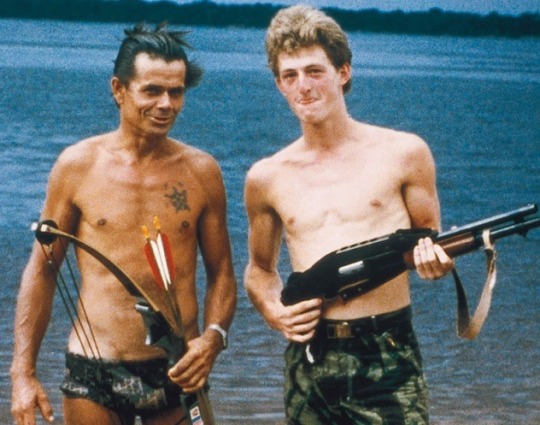
In 1980, 28-year-old Californian, John Reed, left home to travel to Brazil in an attempt to discover the lost city of Akakor. It is said that Akakor is an ancient underground civilization that has remained undiscovered deep in the Amazonian jungle. Reed had read about this lost city in The Chronicle of Akakor, written by Karl Brugger. Brugger wrote this book after learning about the city from a Brazilian jungle tour guide by the name of Tatunca Nara, who is photographed above on the left. He had claimed that he was chief of the tribe 3,000 years ago.
Tatunca lived in a village by the name of Barcelos and ran a business in which he led tourists into the jungle in an attempt to search for Akakor. Reed met up with Tatunca and went on one of his expeditions into the jungle. He left behind his plane ticket in his hotel room and never returned. Eventually, it was discovered that Tatunca Nara was actually a German man by the name of Gunther Hauck. He always declared that Reed had ran off in the jungle and he never saw him again, but it was revealed that Reed was not the only person to disappear on these expeditions - two other people went to the jungle with him and never returned.
It was also revealed that Karl Brugger was shot dead in Rio in 1984. Authorities have always believed that Gunther Hauck was responsible for his murder and also the three disappearances but sadly there is not enough evidence for a conviction.
77 notes
·
View notes
Text
Şu toplumsal organizmanın canlılığı kadar şaşırtıcı bir şey yok dünyada... En büyük felaketlerin karşısında bile nasıl dayanıyor, kendini besliyor; giydiriyor, eğlendiriyor...
7 notes
·
View notes
Photo
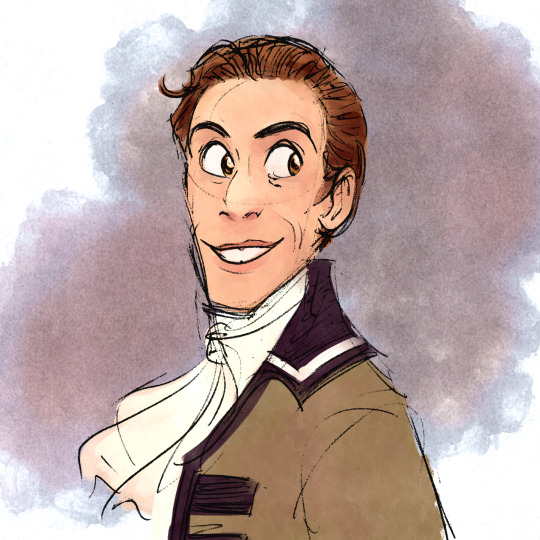
A John Reed inspired Robin Oakapple. I referenced these photos: (click) (click)
This guy has a very specific face and it complements all his vocal mannerisms quite well, really fun to draw.
48 notes
·
View notes
Text

George Herms, Wallace Berman, Robert Alexander, John Reed
2 notes
·
View notes
Text
With a cover date of April, 1988, DC launched Checkmate (Harvey Bullock, Grace Guinness, Phil Kramer, Scott Jameson, John Reed, Gary Washington, and B.J.) which was an organization run by Amanda Waller and Harry Stein. The first issue introduced the terrorist group the American Supremacist Party - A.S.P. (Kevin Maxwell, Larry, Dave, Moose, and William Cross). They were created by Paul Kupperburg and Steve Erwin. ("Opening Gambit!", Checkmate 1#, DC Comic, Event)
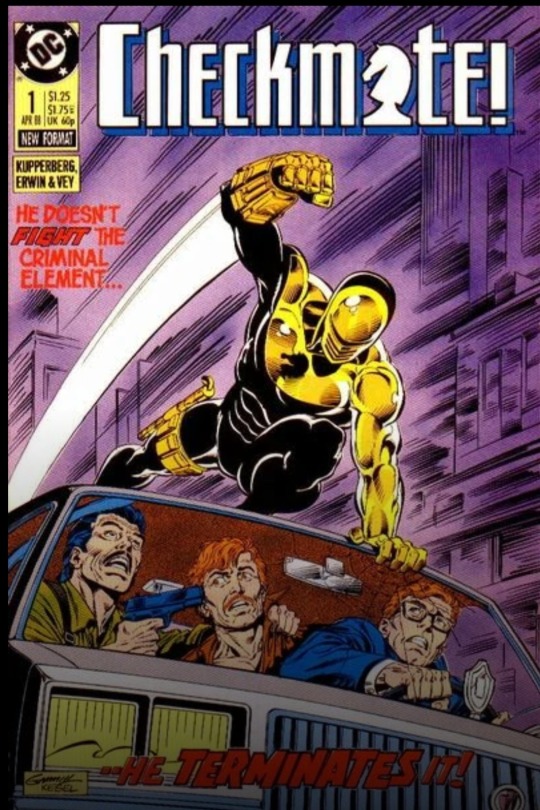
#nerds yearbook#real life event#first appearance#comic book#dc#dc comics#april#1988#checkmate#paul kupperberg#steve erwin#amanda waller#harry stein#harvey bullock#grace guinness#phil kramer#scott jameson#john reed#gary washington#b.j.#black thorn#american Supremacist party#a.s.p.#kevin maxwell#moose#chicago#new york#virginia
4 notes
·
View notes
Text
ok so i'm fascinated by the exchange between sally and john that told us SO MUCH about their relationship with so little dialogue

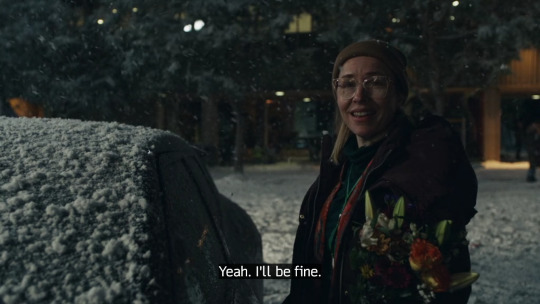



It's pretty clear that Sally is not doing well despite appearances. She's so deeply insecure she has to ask her teenage son if her play was good. When John says "I love you," Sally does not say it back. I don't know the details of why John was so concerned that his mom wouldn't be okay on what should've been a great night for her, but certainly it doesn't imply anything good about her mental health state. It also implies that John has had to grow up way too fast in order to be her support system.
So yeah. Nobody here is healthy.
332 notes
·
View notes
Text
“The ladies of the minor bureaucratic set took tea with each other in the afternoon, carrying each her little gold or silver or jewelled sugar-box, and half a loaf of bread in her muff, and wished that the Tsar were back, or that the Germans would come, or anything that would solve the servant problem…. The daughter of a friend of mine came home one afternoon in hysterics because the woman street-car conductor had called her "Comrade!”
― John Reed, Ten Days that Shook the World
3 notes
·
View notes
Text
s ez minden? igen, ez minden. hol a kivezető út?... mikor lesz béke? amikor a szövetségesek megengedik.
#john reed#tíz nap amely megrengette a világot#napló#gondolatnapló#gondolat#nagyoncringe#magyar#depresszió#szorongás#öngyilkosság#saját#szeretet
3 notes
·
View notes
Text
0 notes
Text
https://romaniasweetromania.com/2020/05/hotel-athenee-palace-bucharest/

#5*hotel#Amalfi#Ana Hotels#Brigitte Bardot#Camil Petrescu#ceausescu#countess Waldeck#Duiliu Marcu#Eugen Jebeleanu#Geo Bogza#Hotel Athenee Palace Bucuresti#Hotel Hilton Bucuresti#John Reed#Lady Gaga#Messi#Nichita Stanescu#Nicholas Cage#Nixon#Octavian Goga#Paolo Coelho#Pastorel Teodoreanu#Rolling Stones#Tom Jones#visit Romania#visit Bucharest#hotels in Bucharest
0 notes